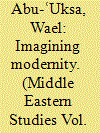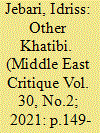| Srl | Item |
| 1 |
ID:
184466


|
|
|
|
|
| Summary/Abstract |
The spike in the number of Arabic writings on the nahḍah since the beginning of the 1990 s represents a new and intriguing development in contemporary Arab thought. This relatively recent nahḍah-frenzy is best reflected in the new editions, collections and re-publications of nahdawi writers whose articles and essays remained, until recently, scattered and dispersed. Why did the 1990 s mark a time where the need to repackage of Nahda literature became urgent? This article argues that only through contextualizing the question of nahḍah within the growing Arab debate on turath, this question finds its resolution. Offering to dissect the debate on turath, explicating the motives that stood behind its propounders, and the cultural sensibilities its gave rise to, affords a vantage point through which to explain the obsession with nahḍah in the post-colonial Arab world.
|
|
|
|
|
|
|
|
|
|
|
|
|
|
|
|
| 2 |
ID:
166763


|
|
|
|
|
| Summary/Abstract |
This article employs the methodology of conceptual history to contest two of the most common theoretical approaches dominating our understanding of modernity in the field of Middle Eastern studies. The first approach relies on the assumption of incompatibility between modernity and Islam and captures Arab modernity using concepts such as ‘adoption’. The second understands Arab modernity through concepts such as ‘imitation’, contending that it is a legacy of Western imperialism. This article challenges both theories by examining the genealogy of tamaddun (civilization, being civilized), a pivotal concept used in nineteenth-century Arabic to imagine modernity. The genealogy of tamaddun elucidates that medieval paradigms derived from the concept of madina (polity) were rediscovered, reimagined, and reused in the context of the rise of the nation-state and the challenge of Western imperialism. The article suggests understanding Arab modernity and its critique from within, rather than outside of, the temporality of the historical condition.
|
|
|
|
|
|
|
|
|
|
|
|
|
|
|
|
| 3 |
ID:
180011


|
|
|
|
|
| Summary/Abstract |
The recent revival of interest in Moroccan thinker Abdelkebir Khatibi (1938–2009) around the English release of his seminal 1983 essay, Maghreb Pluriel represents an opportunity to place this thinker in the inner circle of post-1967 Arab thought. This article argues that most coverage and commemoration of him has been devoted to a glorified side of his trajectory that fits neatly within the framework of ‘postcolonial francophone intellectuals.’ However, this article argues that we must revise the meaning of his seminal book and his call for a ‘plural Maghreb’ to see it also as the demise of his project for a decolonized sociology in Morocco, which was necessary to set his sights toward semiology and his significant literary oeuvre. His example informs us on Arab intellectual strategies after the end of grand ideological narratives, and how to write Arab intellectual and cultural histories without succumbing to the trap of nostalgia.
|
|
|
|
|
|
|
|
|
|
|
|
|
|
|
|